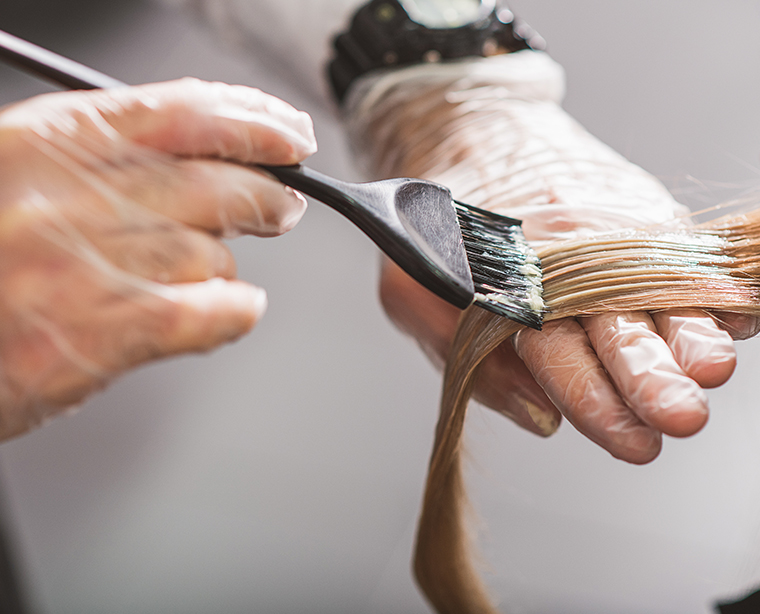

Eczema at work: causes and solutions

The most commonly affected professions
Some professionals are more likely to come into contact with products that may cause eczema either because they are irritants or contain allergens. Manual occupations are particularly affected.
Below is a list of the professions most commonly associated with work-related eczema:
- Hairdressers
- Healthcare personnel: hospital workers, nurses, dentists and dental staff
- Construction workers
- Cleaning personnel
- Metal industry professionals
- Food industry professionals: bakers, cooks
- Florists, gardeners
- Farmers
- Veterinarians
What to do if you have work-related eczema
Identify what type of eczema you have
Contact eczema
Work-related eczema is a case of contact eczema. The skin often comes into contact with a substance and has an abnormal reaction. There are two possible scenarios:
- allergic eczema triggered by dyes, industrial oils, plastic resins and adhesives, inks, paints, metals, plants, etc.
- Irritant eczema associated with the repeated use of detergents, excess soap or degreasing agents, etc.
Protein contact dermatitis
Let’s focus on this common, but often over-looked, eczema which affects mainly food industry professionals and those who work with animals. Sensitizing proteins can originate from plants (vegetables, fruit, etc.), animals (meat, eggs, bovine amniotic fluid, etc.), or even fungi and enzymes. A few typical examples: a cook handling salmon, a baker using flour, a veterinarian helping to calve a cow, etc. Latex in rubber gloves may also cause this type of eczema.
Dermatitis is associated with both an immediate allergy (itching or urticaria) and a delayed reaction presenting as eczema within a few hours or days.
Atopic eczema
Atopic eczema can be triggered or aggravated by a professional activity that irritates the skin. What’s more, atopic eczema can be accompanied by a case of contact eczema. In fact, it should be noted that people with atopic eczema are at higher risk of developing work-related contact eczema. If you have atopic eczema, you should take this into consideration early on in your career orientation plans in order to avoid going into a high-risk profession only to have to quit later.
Medical follow-up
In the case of work-related contact eczema, your primary care physician or occupational physician will refer you to a dermato-allergologist to identify the substance responsible. This investigation involves asking you a number of questions about your work habits to help identify the allergen, in the case of allergic eczema, or irritant, if you have irritant eczema. The dermato-allergologist will then carry out a series of tests with the substances in question. They have access to the manufacturers’ product “ID cards” (Safety Data Sheet) to find out whether they contain common allergens. This information helps narrow down the tests.
With regard to treatment, cortisone cream (topical corticosteroids) is the standard treatment, as with all types of eczema. This is paired with a hydrating cream to repair the skin, along with avoidance of the triggering substance, of course! For more severe cases, other general treatments for eczema are available.
Hand eczema: the most common work-related eczema
An especially painful type of eczema
If you have hand eczema, it is likely related to your job, as half of all cases are. A veterinarian who has an allergic reaction to the cow’s amniotic fluid, a hairdresser who reacts to hair dyes, or a dishwasher in a restaurant who suffers from irritant eczema due to spending hours at the sink... Hand eczema can be especially painful and debilitating, since we use our hands so often. This type of eczema tends to persist and become chronic or even severe.
The solution: gloves
Be sure to protect your hands, and not just on the job. For all manual tasks, such as washing dishes or peeling vegetables, wear gloves to prevent triggering or aggravating eczema.
The type of gloves depends on the task. Another great tip: check the permeation rate of solvents/chemical ingredients on the Shield Scientific website.
Change your gloves regularly. Used gloves become porous and may provide ineffective protection. Also, avoid wearing them too long to prevent the skin underneath from becoming too moist. Change your gloves every 20 to 30 minutes. In case of severe eczema, try wearing cotton gloves under the plastic or rubber gloves.
Professional impact
Occupational disease and coverage
Work-related eczema can result in repeated absences from work or frequent requests for special provisions, making it a potential bone of contention with employers.
Know your rights; you have more than you may think. In some cases, you may even qualify for a recognition of disabled workers (Reconnaissance de Qualification en Travailleur Handicapé - RQTH) or recognition of an occupational disease (Table 65 of the French general health insurance scheme and Table 44 of the French agricultural scheme).
Solutions before a career change
In the most severe and chronic cases, professional reorientation may be recommended and may even be supported with a training program.
But not every case of work-related eczema necessarily requires a career change. This can often be avoided by implementing a few solutions, such as adapting your workstation, or by taking precautions like wearing gloves.

